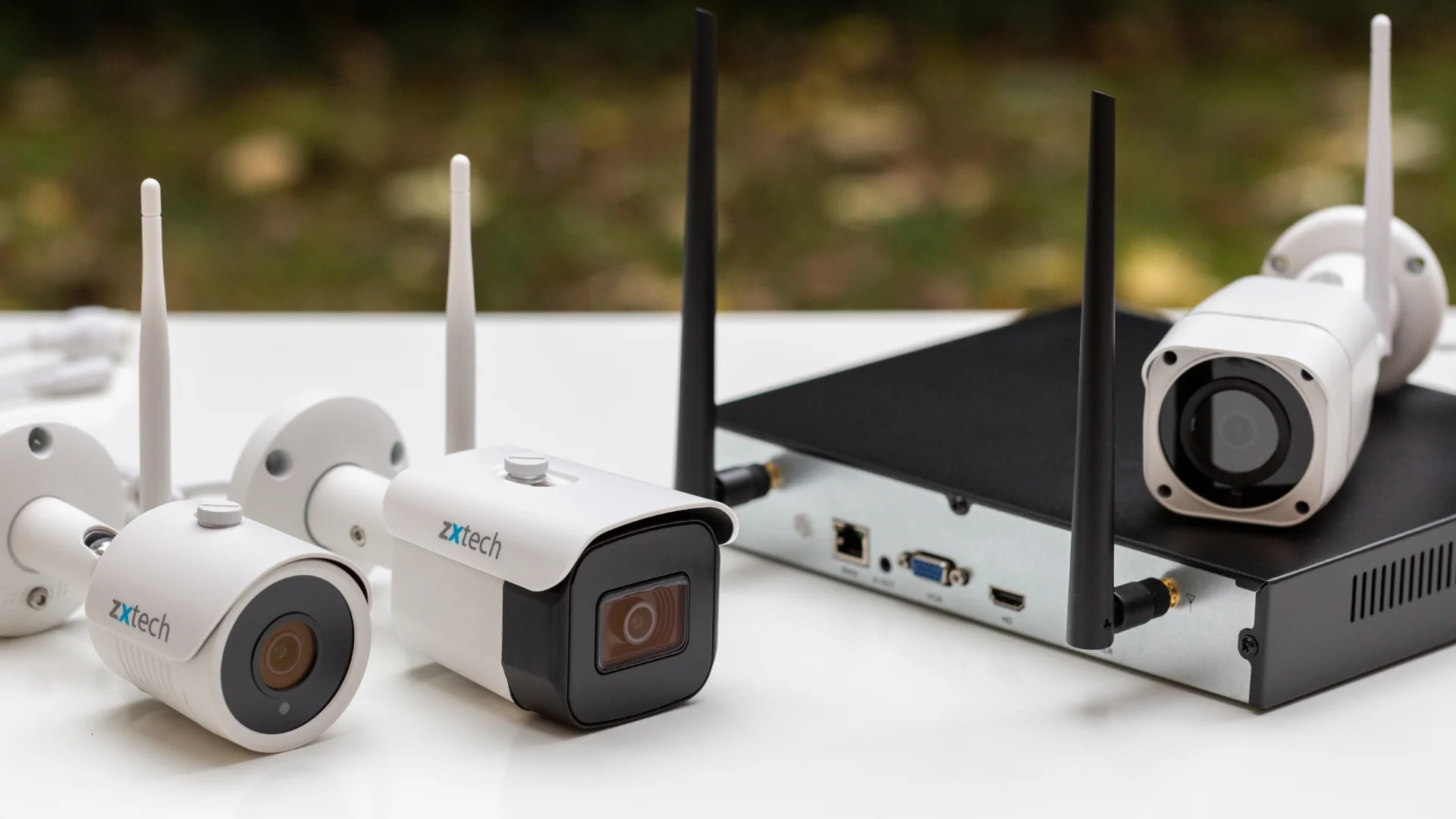
CCTV Installation
CCTV cameras are a staple in crime prevention because they help ward off criminals, monitor building premises, and record valuable footage of events. Whether you’re looking to reduce theft and loitering in your business or provide a safe haven for your residents, it is important to know the basics about video surveillance CCTV systems.
What Is CCTV?
CCTV cameras are used for security monitoring and surveillance in any type of facility. CCTV stands for Closed-Circuit Television, because CCTV systems transmit video footage over a single channel, essentially creating a closed circuit. This means CCTV footage is displayed on a limited number of personal monitors and screens, not publicly broadcasted.
How Does CCTV Work?
CCTV systems use cameras to capture video footage of a facility. This footage is sent to a recording device (a DVR or NVR), where it is stored for future reference. It is then sent from the cameras to a dedicated monitor, or even a smartphone or computer, which displays the footage in real time. CCTV security systems are connected with a coaxial cable, network cable, or wireless signal, depending on the system type.
CCTV cameras are typically placed at business entrances and around the perimeter, as well as in strategic places inside the building. They guard merchandise, data, and the safety of employees and visitors by monitoring and recording everyone that comes near. CCTV surveillance cameras work to prevent crime around the clock, letting property managers and security staff instantly see and respond to security breaches in all areas of a property. Anyone who commits a crime on the property is taped, providing easy identification and legal evidence.
What Are the Benefits of CCTV Surveillance?
CCTV installation has been shown to effectively deter criminals from targeting your facility and the area around it. Many burglars know to look around for security cameras to see if they are being monitored — and seeing a high-quality surveillance system in place will convince many criminals to move on. Nobody wants to risk being caught committing a crime on video.
CCTV systems make it easy for property owners and managers to identify anyone who has committed a crime in their facility. Cameras also help to catch and prevent theft by employees, especially in retail and industrial settings. In large facilities such as warehouses, security cameras let staff view operations in multiple places at once, enforcing safety protocols and keeping track of progress.
Security cameras capture time-stamped evidence of everything that happens in and around a facility, including accidents, mistakes, and injuries. This is helpful in reducing liability for businesses and settling any disputes that might arise. With CCTV cameras, property managers gain insight and control over their facility and business operations.
Analog Vs. Digital Security Cameras: What’s The Best Option For Your Atlanta Business’s Security/Cctv System?
Technology is ever-evolving, and that holds true in the realm of CCTV security systems, too. Now, businesses are finding that they have a choice. If they already have an analog system, do they upgrade? Is it worth it? And if they are just establishing their security system, should they choose analog or digital CCTV security cameras? If your metro Atlanta-based business is in one of these two categories, you want to make sure you are making an informed decision based on the needs and budget of your company. For this purpose, we put together a list of the pros and cons of both analog and digital video surveillance cameras.
A Primer: Analog Vs. Digital Video Surveillance Cameras
The main difference between analog CCTV and digital (IP) CCTV is the method by which video is recorded and delivered. Analog cameras record images and then send the signal over a coaxial cable to a DVR (Digital Video Recorder). The DVR converts the video from analog to digital signals, compresses the file, and stores it on a hard drive. Monitors need to be hooked up to the DVR to view the video, or the DVR can be connected to a router and modem to broadcast it over the internet through an internal network.
Digital security cameras on IP-based CCTV systems, on the other hand, record the images digitally to begin with. Then, they can receive and send data over a computer network rather than going through a DVR first. This method nixes the boxy setup with multiple ports in favor of an NVR, which is typically a simple software program that can be run on a device dedicated solely to operating the NVR or on a complete system.
Which Security System Is The Better Option?
This is not a simple question to answer, as there are advantages and disadvantages to both analog and digital security camera systems. If you’re going to make a decision, be aware of these pros and cons and weigh them appropriately for your business’s needs.
Analog Security Cameras
Advantages
- Cost: Analog cameras tend to cost less, sometimes even a lot less, than their digital counterparts on a per camera basis.
- Simplicity: DVR is easier to set up and understand for most. It is one unit with one cost, and the installation is a bit more straightforward.
- Lower Bandwidth Requirements: Analog recorded video files tend to be smaller, and they are transmitted to the DVR over coax instead of LAN, so transmitting them doesn’t take as much bandwidth and doesn’t tax your network as much. Plus, DVRs also usually only transmit the information and use bandwidth when someone is viewing the video, rather than on a more constant basis.
- More Design Options: With a wider variety of analog camera designs, you may have an easier time finding a camera model with all of the features you need at a lower cost.
Disadvantages
- Cabling: Because the cameras need to be connected to both the power supply and the DVR via cables, you tend to have a lot of wiring to handle, even if you use cables that bundle video and power. Furthermore, coax cables are usually more expensive on their own than the Cat 5 or 6 counterparts used for digital systems.
- Image Quality: DVR is easier to set up and understand for most. It is one unit with one cost, and the installation is a bit more straightforward.
- Coverage Area: Typically, analog surveillance cameras have a much narrower field of view than their digital counterparts, so you may need more of them to cover the area you need.
- Positioning Limitations: Because analog cameras need to be connected to the DVR, you have to keep these cameras within a reasonable range of the device, or you risk diminishing the reliability of the connection. As a result, you become more limited on where you can place your cameras.
- Port Limitations: DVRs have only so many ports on them, so you can only connect a limited number of cameras to them. If you want to exceed this number, you’ll probably have to get a second DVR.
- Wireless Capability (or Lack Thereof): The reality is that analog wireless systems don’t work very well due to government regulations regarding analog frequencies and signal strength. As a result, other wireless devices and even fluorescent lighting can interfere with and distort the video signal.
- Encryption: Analog signals can’t be encrypted, typically speaking, meaning that it could be easier to for unwanted eyes to view the signal.
Digital Security Camera Systems
Advantages
- Image Quality: The image quality from digital security cameras is significantly higher than analog, with many cameras capable of recording and transmitting high-definition video. Plus, digital cameras are more likely to have digital zoom features, which can have zoom distances over 100ft.
- Coverage Area: A single digital camera can cover an area that would require three or even four of its analog counterparts. As a result, you may require fewer cameras and be able to maintain security surveillance over a wider area.
- Fewer Cables Needed: Instead of individually wiring each camera with power and then cabling each camera to the DVR, digital systems can have multiple cameras connected to a switch, and then all of those cameras on the switch can be connected to the NVR with a single cable.
- Positioning or Port Limitations: Because cameras merely need to be connected to your LAN network in order to connect to your NVR, you are no longer limited by the distance between cameras and the video recorder. As the NVR is software-based and does not have ports, you also eliminate that limitation as well.
- Power over Ethernet (PoE): Power over Ethernet switches enable your signal cables to provide power to the cameras as well, reducing the need for those additional cables.
- Wireless Capability: Digital security camera systems are very good at operating within a wireless network. They are not susceptible to the same kinds of interference that affect their analog counterparts, so you can easily view a live feed from more remote locations if desired.
- Encryption: A lot of digital security cameras have encryption built in, so your data is safer from the beginning of its journey to its end.
Disadvantages
- Setup Complications: If you don’t have the network set up already and the switches in place, these can increase the cost and labor involved in your CCTV installation, regardless of the fact that you’d need fewer cables overall.
- Higher Initial Cost: The cameras and equipment (aside from cables) tend to cost more on an individual basis compared to their analog counterparts (though you might need fewer of them, so the costs may balance out).
- High Bandwidth Requirements: IP security camera systems usually require a lot more bandwidth than analog ones. Between the higher resolution and higher frame rate, even with compression, you’re looking at around 720Kbps, and that’s before considering the newer cameras that have megapixel resolution. As a result, this could drive your costs up.
- Storage Requirements: Higher resolution and higher frame rates mean larger files, so you’ll need a lot more storage space on your hard drive to accommodate them.
